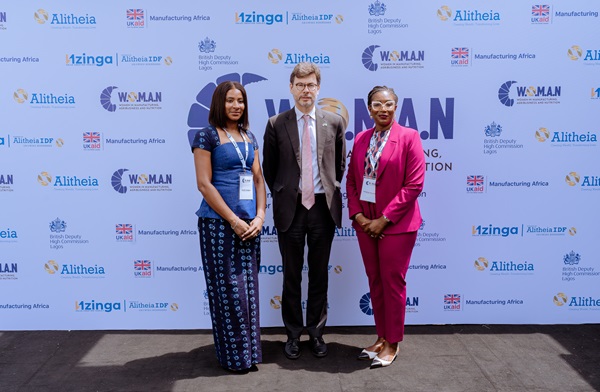
As Nigeria grapples with rising energy costs and the realities of the climate crisis, the British government has restated its dedication to championing inclusive economic growth and sustainable development across Africa.
This commitment was highlighted by the British Deputy High Commissioner in Lagos, Jonny Baxter who spoke at the second edition of W.O.M.A.N by Alitheia, an influential forum for Women in manufacturing, agribusiness and nutrition.
The event, hosted by Alitheia Capital, trailblazer in gender-lens impact investing, was held in collaboration with Manufacturing Africa, a UK government programme designed to attract foreign direct investment into Africa’s manufacturing sector. This year’s gathering, themed “Scaling Sustainable Manufacturing & Energy Transition for Women-led SMEs in Africa,” convened an engaging mix of industry leaders, women entrepreneurs, investors, policymakers and clean energy providers to tackle the critical intersection of sustainability, industrial growth and women’s economic empowerment.
With Nigeria’s small and medium enterprises struggling under the weight of surging fuel prices and high electricity tariffs, the forum focused on how adopting sustainable energy is no longer optional but an urgent economic necessity. Alitheia Capital shared insights from its portfolio, showing that companies that have integrated renewable energy solutions have recorded up to a 60 per cent drop in operational costs, proving that the green transition can deliver real financial benefits alongside environmental impact.
The conversations at the forum centred on practical pathways for women-led SMEs to access reliable and affordable clean energy, embed sustainability into their production processes and become active contributors to Africa’s emerging green economy. Participants exchanged strategies on building stronger support systems, improving access to funding, and scaling businesses without compromising climate goals.
In his address, Baxter underlined the UK’s steadfast support for initiatives that position women as leaders in Africa’s green industrial transformation. He noted that the UK’s partnership with Alitheia Capital through the W\.O.M.A.N. forum is part of a broader effort to deepen inclusive growth by backing women-led businesses with capital, training, and the right policies. He reiterated that unlocking sustainable industrialisation must be equitable and that empowering women entrepreneurs is key to driving Africa’s resilient economic future.
Co-founder and managing partner at Alitheia Capital, Tokunboh Ishmael stressed that sustainability has moved beyond being a mere buzzword to becoming a business-critical priority. She emphasised that women entrepreneurs, who form the backbone of Nigeria’s industrial sector, stand to gain the most from adopting clean energy and innovative manufacturing practices. She added that Alitheia remains committed to scaling proven solutions that lower costs and build resilient businesses.
According to Onyinye Madu of the British High Commission’s communications office, the event featured inspiring keynote speeches and robust panel discussions with prominent industry voices such as Yemisi Iranloye of Psaltry, Affiong Williams of ReelFruit, Temilola Adepetun of SKLD, James Fabola of Arnergy Solar, Bukola Badmos of Starsight Energy and Sarah Ogbewey of Sterling Bank.
Alitheia Capital used the occasion to launch Nzinga, its new SME capacity-building platform designed to equip entrepreneurs with practical skills for scaling sustainably. Manufacturing Africa also introduced its Green Business Building accelerator, a dedicated programme to tackle core business challenges and cultivate an ecosystem for green manufacturing and job creation in Nigeria.
The day concluded with an ESG knowledge-sharing session and exhibitions showcasing green manufacturing and renewable energy solutions. The gathering ended with a collective call for more inclusive financing, supportive policy frameworks and stronger networks that can deliver Africa’s vision of a fair, prosperous and sustainable industrial revolution led by women.

